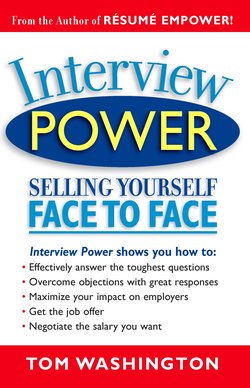Читать книгу Interview Power - Tom Washington - Страница 20
На сайте Литреса книга снята с продажи.
Selling Potential Can Overcome A Lack Of Experience
ОглавлениеSelling potential can get you job offers when others have more direct experience. Tim, who has been the chief financial officer of three companies, states that among the 30 or more people he has hired, he has never hired the “most qualified” person. He is quick to say he always hires qualified people. In fact, candidates are not even interviewed unless they have demonstrated competence in all key areas. But after narrowing the field down to two or three, he usually finds himself drawn to the person who shows great drive and desire. That person has never been the one with the most direct experience. It seems that those with the most experience generally fail to fully demonstrate enthusiasm and potential.
An interesting thing occurs during an interview as you sell your enthusiasm and potential. It begins with the employer’s decision to interview you. Perhaps out of the six who were invited for interviews, you were rated number six, merely because you lacked some experience that was desired which the other candidates had. As you learned about the job, you knew it would be a challenge for you, but you also knew you could do it, and you knew you would enjoy experiencing a steep learning curve. As a result, your enthusiasm came out spontaneously during your interviews. You also related some interesting stories which demonstrated your strong work ethic, your desire for growth, and your ability to successfully take on new challenges. You came across as a person who would fit in well with the team. Three others who had more experience did not demonstrate such qualities and did not get second interviews.
When you learned you were being invited back for a second interview, your desire for the job motivated you to do more research on the organization. You learned about some problems (or challenges) you felt you could really tackle and help solve. In the second interview, you maintained your high level of enthusiasm and you sold your potential by sharing experiences that demonstrated your ability to contribute in these problem areas. You weren’t aware of it yet, but the employer began to actually picture you in the job. The employer began leaning toward choosing you. As the employer’s preference for you became stronger, she realized that she actually liked you better than the other two candidates. She hesitated to hire you, however, because on paper you were not as strong as the other two. But then she began a justification process: Granted, she might have to spend more time training you, but at least you would be trained in her methods. The other two could come in tomorrow and handle the job from day one, but they might insist on using their old methods.
Your ability to sell both your potential and your ability to learn new processes quickly made the employer realize that even though the other two candidates could do the job better for the first several months, your drive and ambition would probably put you ahead of them after six months. Can you see how this process unfolds during two or three interviews? It accurately describes the thought process that occurs in the minds of employers.
Being able to demonstrate enthusiasm and potential is just as crucial to the experienced person as it is for the less-experienced person. If you are experienced, let your enthusiasm come through as you explain how much you enjoy your field or work. Demonstrate your potential by discussing recent, solid, work-related accomplishments. This will indicate to the employer that there are many future accomplishments yet to come.
